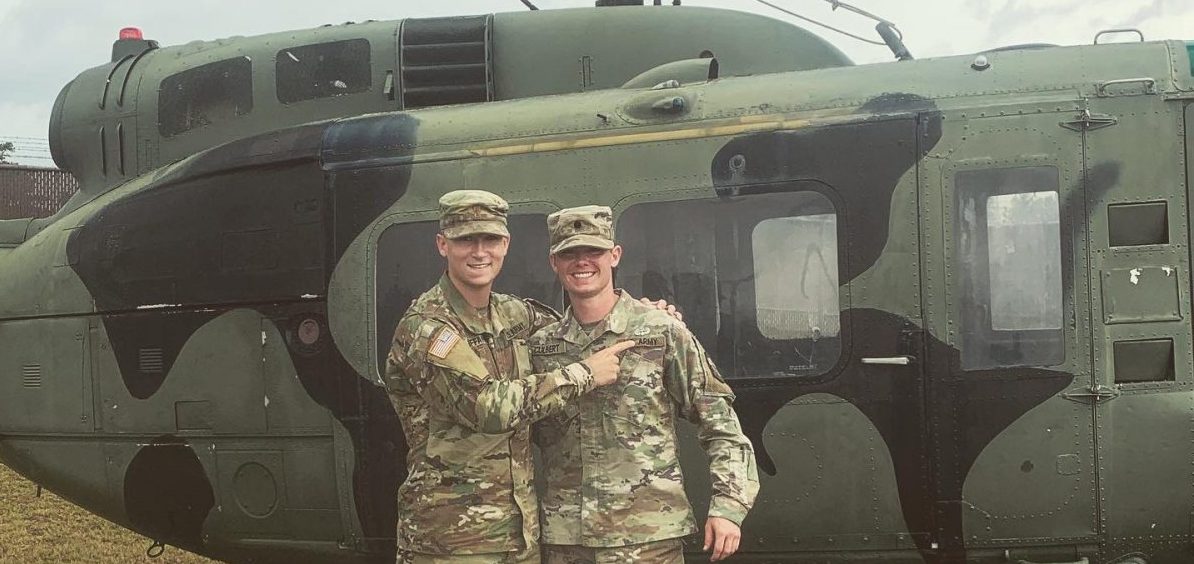
Bobcat Battalion Cadets Leave a Legacy of Excellence
By: Abby Ludwig
Posted on:
He looked down at his feet, each hard thud against the pavement a reminder of the legacy at stake. With dry canteens at his sides and 35 pounds weighing heavy on his back, it took everything in him to drag each boot forward. He was slumped, bones aching from exhaustion and eyes tired from the 11 miles weathered by his body. With his competitor’s steps echoing not but five feet behind, he lifted his gaze, helmet sliding against his slick forehead, and continued on.
Air Assault School is considered to be one of the most difficult courses the United States Army has to offer. Soldiers from duty stations around the globe compete for slots, with nervous excitement and anxiety itching at the back of their brains. Thoughts of whirring helicopter blades and long road marches propel them into preparation, each convincing themselves that they will not be one of the many who never make it to graduation day.
Amidst those devoted servicemen were Cadets Erin Dietz, Isaac Culbert, and Austin Dick, all of whom had one thing in common: their home. These three soldiers came from the Bobcat Battalion, Ohio University’s highly-recognized Army ROTC program. While they may differ in size, gender, and abilities, their unmatched dedication thrust them into the honored positions they would come to win.
Every year, Ohio University, along with dozens of other ROTC programs, hand-selects accomplished cadets for coveted opportunities within the “Big Army.” Ranging from work with foreign militaries to training in cold mountain peaks, students across the country embark on demanding adventures during what would’ve been their summer vacations.
Due to their inherent intelligence, leadership abilities, and superior athleticism, Dick, Dietz, and Culbert were all given an offer no future lieutenant could turn down: a trip to Air Assault School.
Getting the Call
Ohio University is full of achieving cadets, with an overtone of established excellence dating back to its creation in 1936. Because of this adherence to tenacity and talent, Bobcat Battalion cadets find themselves battling for spots against some of their most adept peers, all within their own program.
“Just getting a slot to Air Assault School left me in disbelief,” Cadet Culbert said.
Cadets Dick and Dietz received their spot as sophomores, and Cadet Culbert as a junior. When they arrived at their respective bases, however, they would be some of the youngest present, with active duty officers and non-commissioned officers inhabiting their ranks. Aware of the obstacles the school itself would present, along with the prestigious soldiers by their side, each cadet knew hard-wrought training was an essential task rather than an option.
The students searched intensely for information, some turning to the experiences of their trusted peers who had gone before them, others scrubbing the Internet for any real source of expertise. Each cadet, however, knew that the infamous “Day Zero” is where most of their efforts should be focused. In the months they had left prior to their start, they spent endless hours dedicated to improving their fitness in a way that had never been required of them before. From rucks to rope climbs, they worked long into evenings, driven by something not even they could fully understand.
With muscles bound and triple-checked gear in-tow, the three cadets flew out to Ft. Benning and Ft. Campbell, sites that would completely dominate their minds and bodies for the weeks to come.
An Unparalleled School
After monotonous administrative work and in-processing, everything took a drastic turn to organized chaos. Day Zero had begun. All soldiers launched into grueling physical activities, from obstacle to obstacle, with Air Assault instructors never allowing a single heart rate to slow.
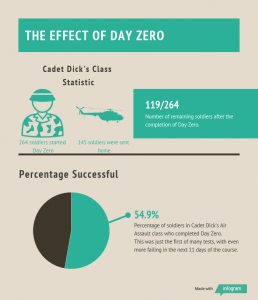
“Prior to the obstacle course, we first had to engage in a long and grueling smoke session,” Cadet Dick said.
“This was the most challenging aspect because honestly, I had never experienced anything like it, especially for that long. They would drop people if they even looked like they were slacking.”
Cadet Dick’s class started with 264 people, but by the time the sun had set on Day Zero, only 119 remained.
Air Assault is generally split up into three phases: Combat Assault Phase, Slingload Phase, and Rappelling Phase. The first of these was classroom heavy, with door-stop size packets and long hours of instruction consuming the day. Information was being spit out as fast as could be absorbed on topics ranging anywhere from medical evacuation procedures to rotary airframe dynamics. The soldiers had just three days to inhale as many details as their mind would allow, spending any free time they had completing homework and attempting to solidify the facts they needed to continue.
The next phase focused solely on sling loads, the most onerous and fear-inspiring of the days at Air Assault School. Here, soldiers essentially learned every minute detail essential to attaching large equipment to helicopters for successful transport. It sounds monotonous, or even easy to those who have never arduously learned the skill. However, to any who have passed, or even to those who have failed, it is obvious that this task carries with it both great risks and great responsibility.
“At the end of this phase, there was a timed practical. It might not have seemed that difficult when practicing, but the time limit immediately amps up the stress levels,” Cadet Dietz noted.
The difficulty of the course was reaching its peak, at least intellectually, and the numbers of successful students continued to dwindle. Only the harshly dedicated remained, with only a few days and an intensive ruck march left to endure.
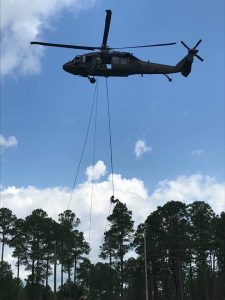
With the hardest tests behind them, the soldiers carried on to their last learning phase: rappelling. It may sound like the Hollywood stunt every 10-year-old boy dreams of. It may sound absolutely terrifying. To most of the geared-up servicemen about to lean backward out of a helicopter, however, this was the best part. Working their way up from slanted walls to a UH-60 Blackhawk, each soldier successfully hooked, locked-in, and rappelled down to their final destination.
They may have passed their phases, but there was still one formidable task between the soldiers and their coveted wings. They knew it was coming, knew how fast they had to go, knew what was at stake. For these three however, it wasn’t just the wings. The even more illustrious title of Honor Graduate was theirs if they crossed that finish line, effectively making them the top performing student in their entire class. Twelve miles of road stretched into the distance, with only themselves, the hulking packs on their backs, and the blisters forming in their boots. Their will to finish became the sole reason for each step.
Unparalleled People
Stories of brotherhood and comradery have filled history books and first-hand tales for centuries: men and women bound tightly together, adversity only strengthening the bond within. There are endless accounts of heroics, parables of friendship, legends of a love the few who serve can only truly understand. There is a sort of comfort in knowing you are never at it alone. For these cadets, it seemed this last chance would’ve proven nearly impossible if not for the strength found within the heart of the soldiers to their left and right.
The first of these anecdotes comes from Cadet Dietz, who was aware prior to this final exercise that Honor Graduate was hers if she simply finished. “Simply” doesn’t always mean easy however, and the punishing hours ahead seemed formidable. Luckily, she said, she wasn’t alone. Next to her through every hour of the aching shuffle was Cadet Will Davis, yet another member of the Bobcat Battalion.
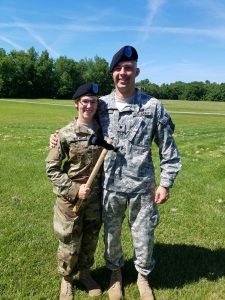
“Honestly, I can’t thank him enough for doing what he did,” Dietz said.
“While I believe I still would have finished, it was so much more enjoyable with him there, even if he didn’t talk a whole lot for the three hours we were walking.”
With her trusted classmate and faithful friend by her side, Dietz completed the road march with wings in her possession and an esteemed accomplishment won with honor.
Though 420 miles south, another cadet became acutely aware of how much the footsteps next to him could come to mean. Culbert was just a day shy of graduation when he learned that he too was in-line to complete Air Assault School at the top of his class, the only difference being that two others were in the exact same spot.

“I know there are three of you, but we do things here barbarian style,” the Senior Air Assault Sergeant stated.
It was declared that the winner of the ruck would take the award, no negotiations on the table. The other two soldiers’ energy and anxiety heightened immediately, interrogating each other in a last-ditch effort of preparation. Culbert remained calm and quiet, knowing that if he had any chance of winning, focus may be his only friend.
As Culbert pulled away with an early start, one of the other contenders seemed to be constantly at his heels. With the soldier gradually passing him, Culbert came upon another struggling soul: a man from Special Forces pushing through the rough of a dreadful ruck. The SF service member quickly recognized Culbert, the two instantly bonding through an inspired competitive nature and a loyalty to a comrade in pain. They made a simple pact: to not leave each other, and to win. At mile nine, the other competitor once again pulled ahead. Culbert locked eyes with his newly-established confidante.
“Don’t wait for me,” the SF soldier said. “I want you to beat this guy.”
Fresh out of water and knees aching with hours of pressure, Cadet Culbert pulled across the finish with his most talented opponent only five feet behind. He had just won the highly coveted Honor Graduate title.
Culbert, wet with his own sweat and a humble satisfaction in his heart, soon saw his new ally cross the finish line. He told him the news, and the Special Forces soldier stuck out his hand for the cadet to take.
“That handshake between him and I was the most powerful I have ever been a part of,” Culbert said.
“It told a two hour and 23-minute story that I will never be able to forget.”
What it Means
Millions have signed their name on that dotted line, all with reasons shaking in the fingertips wrapped around that pen. To some, it is about supporting a family they love more than their own beating heart. For others, it’s about pride in a flag that was birthed out of courage, and has since endured the tests of time, fear, and hate. For some, it is about the blood already lost: a dedication to brothers now housed under a simple white headstone.
For Cadet Dick, it was about a clear dream and a loyalty to tradition. It was never a question for him. From his youngest days, his future seemed obvious: to serve. He had seen two older siblings take the same pledge, one enlisting and one commissioning as an officer from the Bobcat Battalion itself. When it came time for his decision, he followed directly in his sister’s footsteps, all the way down to a prominent slot in the famed Air Assault School.
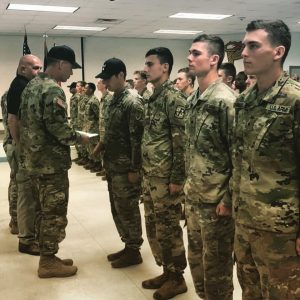
Culbert too had a bloodline that ran deep in green. With the heritage of his late uncle and grandfather etched into his heart, serving with every ounce of strength within him seemed the purest of ways to honor their memory. He found himself among the most professional of athletes, “the greatest team on earth,” as he calls it.
Dick, Dietz, and Culbert all stepped into their schools with apprehensive minds, servile hearts, and excellence in their actions. All would come to know the honor of skills few possess, with stories of men and women willing to give their spirits in support of another. With wings pinned upon their chests, tokens in hand, and Honor Graduate certificates tucked away in safety, each quietly boarded their planes. They were keenly aware of the fact that few would know their stories, or the brothers they had found, or the cost of one simple title. They sat humbly in their seats, eyes looking hopefully into a career studded with greatness.
The Legacy Left
The ultimate destination of these cadets was none other than Ohio University. With the dead-heat of summer drawing to a close, students meandered back to this small college town. Army ROTC stepped out in their uniforms for the first time in months, with a small black icon on their left chest being the only visible symbol of these cadet’s undefeatable grit.
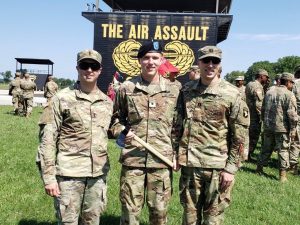
The award these individuals have is not simply a piece of paper. It came from the stress constantly in their heads, the pressure of sergeants breathing down their necks. It was earned, not given. This decoration is highly respected regardless of rank or status, color or creed. The Bobcat Battalion was able to provide the world’s greatest fighting force with a sort of wholehearted transcendence that is nearly impossible to define. If you ask the cadets that make up its ranks, they will tell you there’s something special about this place, about the people they’ve come to call family. Expectations set high and friendships deep.
If you ask Dietz, Dick, or Culbert why they were able to achieve, why they were dutiful, why there is a legacy to follow, they will never mention themselves. To them, the heart of their success lies within a modest set of characters: the cadre. Cadre are non-commissioned and commissioned officers of varying rank, all of whom have taken years of their lives to develop lieutenants they’re proud to have raised. These men are the cadets’ sole mentors and leaders, bringing expertise and guidance from countless missions that students can see only in the deep recesses of their own future possibilities. They go above the call, surrendering hours with family and the peace of mind that comes with other paths they could’ve taken. It is because of them that Ohio University has produced brilliance, and because of the cadets who knew that there are footsteps to be followed.
There is brotherhood and competition, love and bravery. There is an allegiance to the flag, a pride in wearing U.S. Army over their hearts. There is honor in the things they have won and a humbleness in the realization of those who got them there.
There is a desire to pass the torch: to leave a legacy.

